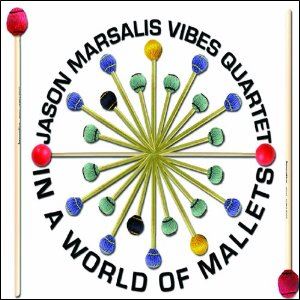
Jason Marsalis’ ‘Mallets’ offers fresh, vibrant sound
3/14/2013

IN A WORLD OF MALLETS
Jason Marsalis Vibes Quartet (Basin Street Records)
Quick, name a standout jazz vibraphonist other than the late Lionel Hampton.
Didn't think so.
Albums like this one, though, make a case for Jason Marsalis to become a modern vibes ambassador. "In a World of Mallets" swings, sways and serves up a rich, jazzy sound with Marsalis leading a talented quartet on vibes, marimba, glockenspiel, tubular bells, and xylophone.
Jason, who grew up as a drummer, is the youngest member of the famous Marsalis musical family that includes father Ellis Marsalis and brothers Wynton, Branford, and Delfeayo Marsalis. Jason recently returned from touring with uber-talents Bela Fleck on banjo and Marcus Roberts on piano.
This fine debut from his new vibes quartet has a fresh and vibrant sound. It's soothing, but also showcases a number of imaginative, complex solos.
— TOM HENRY

THE OTHER LIFE
Shooter Jennings (Black Country Rock/Entertainment One Nashville)
Fans of the old Art Bell Coast to Coast radio show — a call-in program about alien encounters that was a staple of Southern late nights in the ‘90s — might find a lot to like about Shooter Jennings' new album, "The Other Life." There's a bit of a rural-futurist bent (see "Flying Saucer Song" and "15 Million Light-Years Away"), but more importantly, the album shows how quiet, open spaces can lead to great flights of imagination.
"The Other Life" is a showpiece for Jennings' familial knack for outlaw-country hell-raising. Note the Skynyrd-isms of "Mama, It's Just My Medicine" or "The White Trash Song," a collaboration with Scott H. Biram that's less a duet than a drinking game. But it's balanced with ballads of fine, rough beauty. "Wild & Lonesome," with Patty Griffin, owes its sweetness to Willie Nelson and its hoarseness to Jennings' dad, Waylon.
The title track is spare waltz that puts Jennings' vocals and Erik Deutsch's bleary piano up front, and it comes pretty close to devastating. It's the moment you see why Jennings puts so much work into imagining other worlds — because there's a lot of heartbreak in this one.
—AUGUST BROWN, Los Angeles Times

WHAT ABOUT NOW
Bon Jovi (Island)
Bon Jovi is a big band, but which kind? Neutrality has been its bag for most of its mature period, which spans roughly the past decade, and followed its early days of thin-leather arena-rock, notional gestures to hair metal and power ballads.
But aging elegantly is still an option for this group, which has a platform but rarely a firm idea of what to use it for. "What About Now" suggests a few paths for progress, and an ambivalence about committing to any one of them, all under a haze of undifferentiated, low-ambition, lightly rootsy hard rock.
Take album closer "The Fighter," which is a vote for Jon Bon Jovi — frontman, primary songwriter, moral center as introspective troubadour. It's gentle, but maybe not quite sad enough. Or "What About Now," which is a step in the maybe inevitable Springsteen-ization of Bon Jovi.
Maybe pulpy emotion is the way, as on "I'm With You," which has a very blatant nod to the morbid cover of Tears for Fears' "Mad World" by Gary Jules that was a hit a few years back following its inclusion in "Donnie Darko." Or perhaps motivational-speaker positivity is the path, as on the banal "Because We Can."
Bon Jovi is all of these bands, and therefore none of them. Even when it's pushing itself, it remains extremely legible. Its most natural analogues in contemporary pop lie in country, a connection the group made literal a few years ago with the Sugarland collaboration "Who Says You Can't Go Home."
— JON CARAMANICA, New York Times